Science, Engineering & Education Innovation
Science, Engineering & Education Innovation (SEE Innovation) is an interactive public service that provides the public, the scientific community, and policy makers with quick, dynamic access to information about the outcomes of NSF-funded research projects. Learn about innovative research and how NSF awards are funding discovery and evolving the landscape of science across the country. SEE Innovation is your place to find a wide variety of information about NSF-funded projects, their outcomes, and their impacts to society
Begin using Science, Engineering & Education Innovation (SEE Innovation) by clicking on the “Explore thousands of research highlights” linkon the homepage under the NSF Award Highlights section or by clicking on the SEE Innovation link from the footer. (Figure 1)
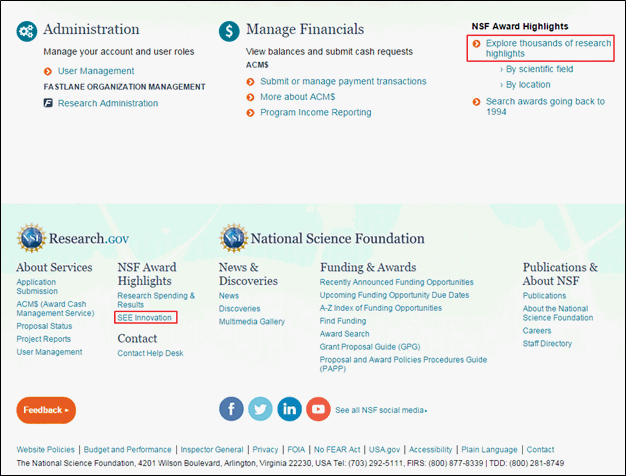
Figure 1 – Open Science, Engineering & Education Innovation from the Research.gov Homepage
There are multiple ways to navigate Science, Engineering & Education Innovation from the Homepage (Figure 1).
· Click through the image gallery on the top of the page to find:
§ Recent Award Highlights: Snapshots about NSF science and research-related awards, with easy-to-understand summaries describing research outcomes of projects and their benefits to society.
§ NSF Research Assets: Centers, facilities & networks, telescopes & observatories, and vehicles that make science and research possible
· Click on the Browse by Map link to search by States and Territories to find information about the awards granted in each state for a given fiscal year, including total amount of funds obligated in a fiscal year, recent award information, and award abstracts.
· Click through the 12 Research Areas to learn more about NSF research and discoveries including research highlights and research assets relating to you research area of interest.
· Use the left-hand navigation to quickly search by Science, Engineering & Education Innovation by clicking on:
§ Research Area
§ States & Territories
§ Research Assets
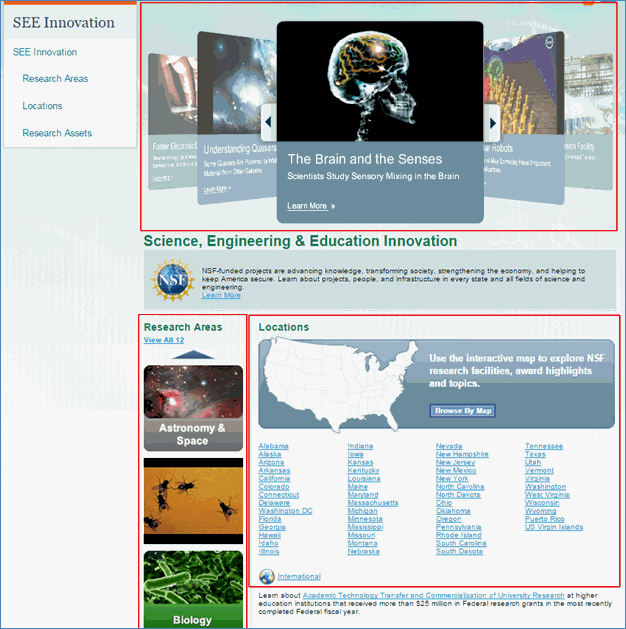
Figure 2 – Ways to Navigate Science, Engineering & Education Innovation Homepage
Types of Information Available
Science, Engineering & Education Innovation offers a view of NSF-funded research and education projects by sharing details about the outcomes of NSF awards, coupled with information about the scientists & engineers, researchers & educators, and resources (research assets) making these discoveries possible.
The following types of information are available through Science, Engineering & Education Innovation:
Award Highlights: Brief summaries that provide a snapshot about the outcomes of NSF-funded research from FY2008 and beyond, as well as how the outcomes of these awards benefit to society.
Research Assets: Information about NSF-funded infrastructure and investments in centers, facilities & networks, telescopes & observatories, vehicles, and more to enable research across the country. Provides an overview of each investment the area of science the research asset impacts and the outcomes it has enabled.
Award Statistics: Users can find award statistics by fiscal year, institution, and award amount from FY 2008 and beyond.
Users can navigate Science, Engineering & Education Innovation by:
Research Areas: The 12 categories NSF uses to group scientific research and education (Astronomy & Space, Biology, Chemistry & Materials, Computing, Earth & Environment, Education, Engineering, Mathematics, Nanoscience, People & Society, Physics, and Polar Research).
States or Territories: Use an interactive map to find a state’s total number of awards in a given fiscal year, total amount of funds obligated in a fiscal year, and recent awards and award abstracts.
Search on Science, Engineering & Education Innovation (SEE Innovation)
For each Research Area, users can view Award Highlights and Research Assets related to that Research Area. These are the same 12 Research Areas used to categorize information on NSF.gov:
Astronomy and Space
Biology
Chemistry & Materials
Computing
Earth & Environment
Education
Engineering
Mathematics
Nanoscience
People and Society
Physics
Polar
There are two ways to search information related to a research area.
1. From the Science, Engineering & Education Innovation homepage users can click through the 12 categories of research funded by NSF.
OR
1. Click on View All 12 or the Research Area link on the left-hand navigation to open the “Research Area” homepage and from the homepage click on a Research Area of interest or Learn More (Figure 3).
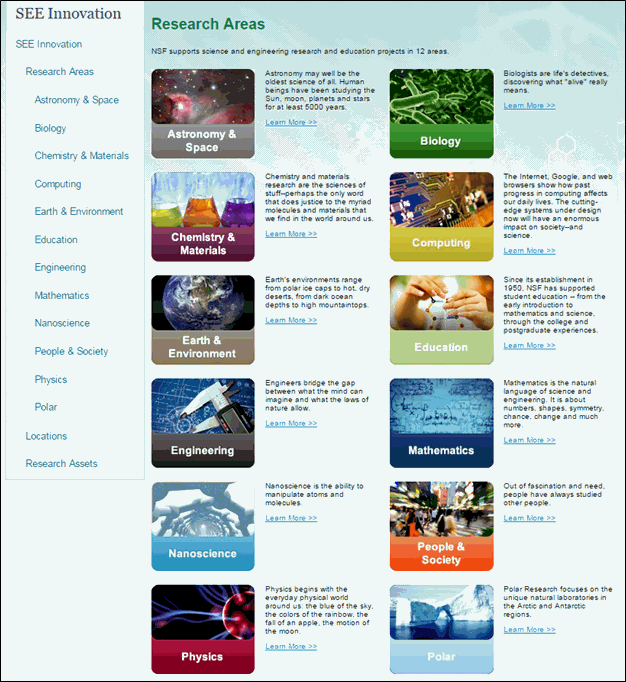
Figure 3 - View Research Area of Interest
Click on an area of interest, This will open a list of the award highlights related to that research area. From here, you can find both Award Highlights and Research Assets related to your Research Area by clicking on the tabs at the top of the search list (Figure 4).
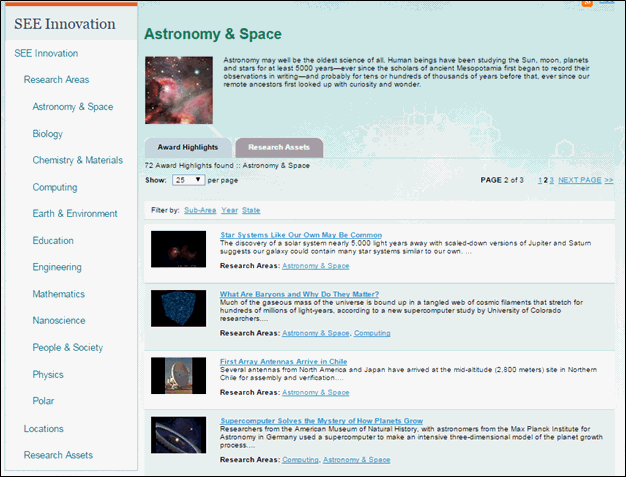
Figure 4 - Research Areas Page
2. Filter the Award Highlights by clicking on the various criteria, including:
- Sub-area
- Year
- State
Click on an Award Highlight to find a synopsis of the award of interest related to this Research Area.
Information in the Award Highlight (Figure 5) includes:
- A link to the Award
- Recipient’s state
- Recipient’s Congressional District
- Research Area that the award is a part of
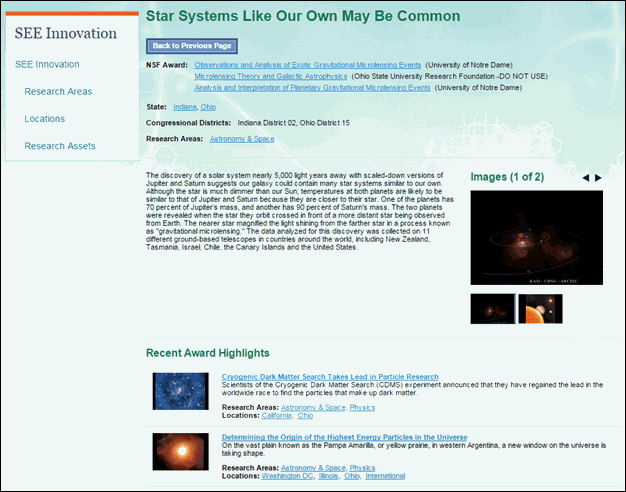
Figure 5 – Award Highlight Page
3. By clicking on the Research Assets tab you can find major NSF-funded research infrastructure related to this Research Area.
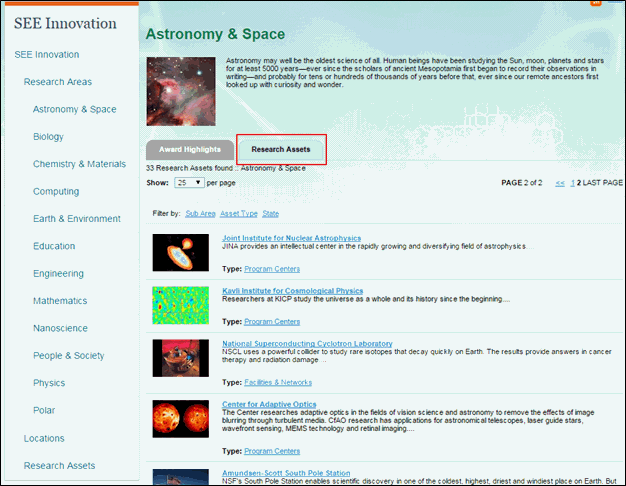
Figure 6 – Find Research Assets Relating to Selected Research Area
Filter the Research Assets search by clicking various filters, including:
Sub-area
Asset type
State
Click on Research Asset of interest. Information on the research asset’s homepage includes:
Institution
Asset Type
Brief description of the asset, including Research Area and Education Outreach Activities
Link to websites associated with the Research Asset
Award Information associated with the Research Asset
Award Highlights associated with the Research Asset
List of related/partner institution
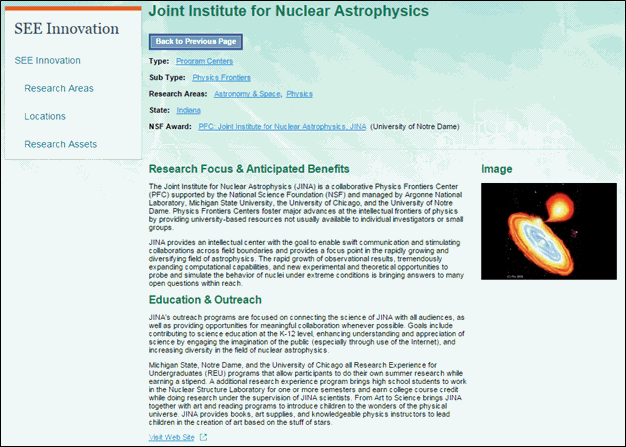
Figure 7 - Research Asset Page
From the Science, Engineering & Education Innovation homepage you can learn more about NSF Research Assets.
1. Click on Research Assets in the left-hand navigation.
2. The Research Assets Homepage opens. Click on a Research Asset of interest or Learn More (Figure 8).
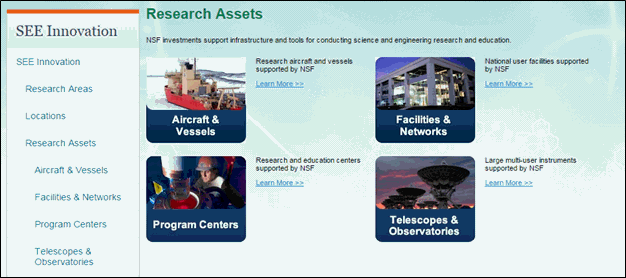
Figure 8 - Research Assets Homepage
There are 4 different areas of Research Assets funded by NSF including:
- Facilities
- Program Centers
- Telescopes & Observatories
- Vehicles
3. The “Research Asset’s” page opens which breaks down the Research Asset into different sub-types (Figure 9). Click on the type of Research Asset of interest or Learn More to find all NSF research assets in that category (Figure 10).
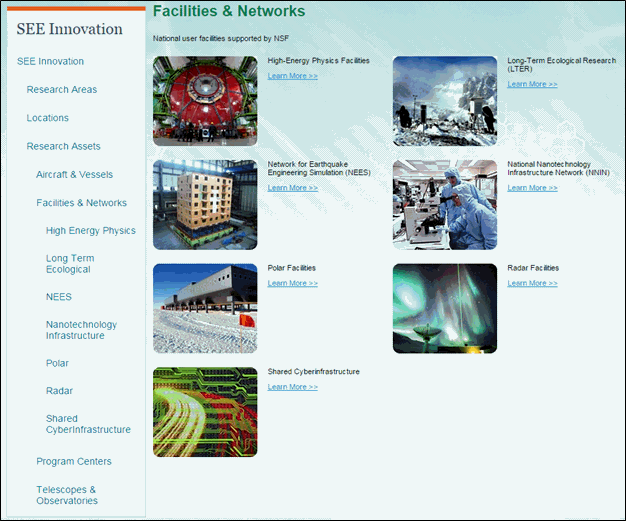
Figure 9 - Research Asset Sub-Types Page
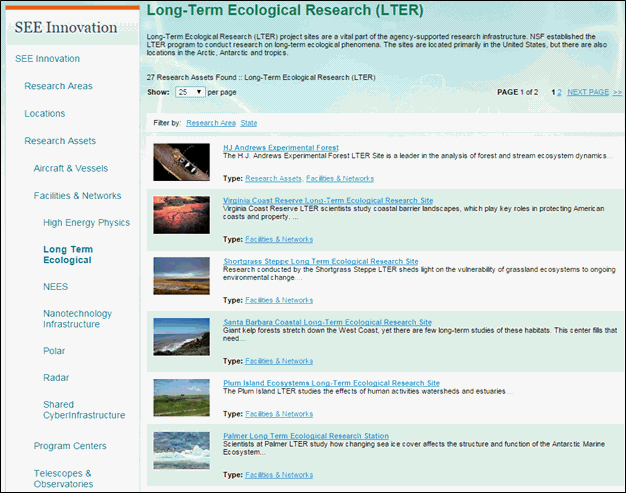
Figure 10 - Research Asset Search Results Homepage
Filter the Research Asset by clicking various filters, including:
- Research Area
- State
4. Click on a specific research asset to open its page (Figure 11).
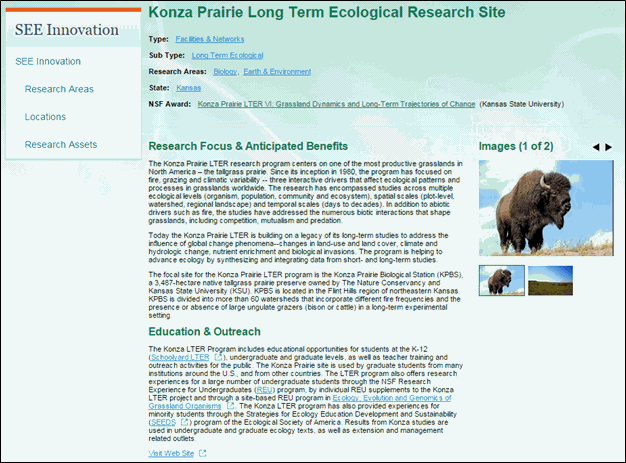
Figure 11 - Detailed Research Asset Page
Information available for each asset includes:
- Institution
- Asset Type
- Brief description of the asset, including Research Areas and Education Outreach Activities
- Link to websites associated with the Research Asset
- Award Information associated with the Research Asset
- Award Highlights associated with the Research Asset
- List of related/partner institution
Users can use an interactive map to explore NSF investments by State or Territory. This interactive map includes the 50 states, Puerto Rico, the US Virgin Islands and international areas. Users can find many different types of information searching by state of territory, including:
- State Statistics: NSF award statistics by U.S. State or Territory, fiscal year, institution, and award amount.
- Award Highlights: Brief summaries that provide a snapshot about the outcomes of NSF-funded research from FY2008 and beyond, as well as how the outcomes of these projects benefit society.
- Local Research Assets: NSF funded research infrastructure, including program centers, facilities & networks, telescopes & observatories, and vehicles.
- Recent Awards and Abstracts (based on Research Spending & Results data).
From SEE Innovation homepage there are 2 ways to search by State and Territory.
1. If you know what state you are interested in, click on the state link at the bottom of the “SEE Innovation” homepage (Figure 12) to open the “State” homepage.
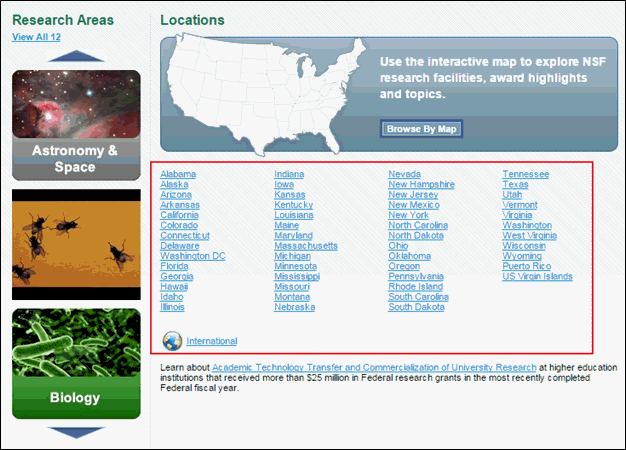
Figure 12 - Search a State from Science, Engineering & Education Innovation Homepage
OR
1. Click on the Browse by Map image or States & Territories link in the left-hand navigation to use the interactive map (Figure 13)
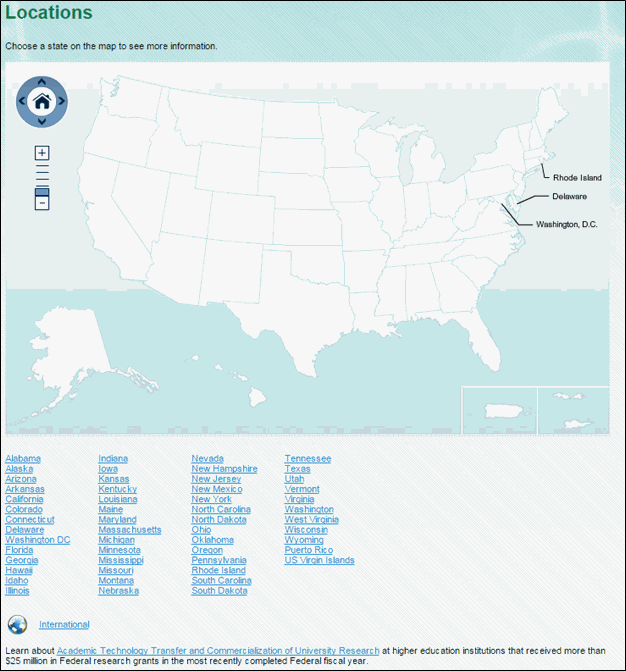
Figure 13 - Search Using Interactive Map from the Science, Engineering & Education Innovation Homepage
2. Using the interactive map, you can click on a specific state or territory to view quick statistics including:
- Total number of awards funded in a given fiscal year, including new awards made and existing awards that received incremental funding (based on information provided by NSF’s Budget office and provide information about the total number of or award total amounts allocated for given fiscal year).
- Total amount of funds obligated in a given fiscal year (based on information provided by NSF’s Budget office and provide information about the total number of or award total amounts allocated for given fiscal year).
- Total number of research assets and total number of NSF awards.
Click on Visit a state to view even more information about the state on the state’s homepage. (Figure 14)
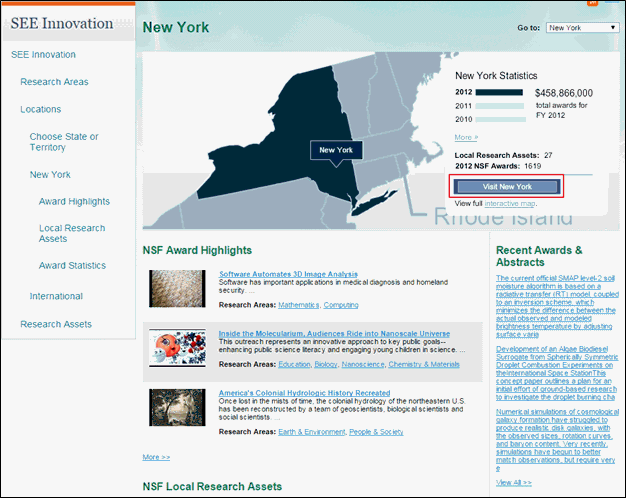
Figure 14 - Quick State Statistics from the Interactive Map
On the state homepage, (Figure 15) you can view:
- State Statistics: NSF award statistics by U.S. State or Territory, fiscal year, institution, and award amount.
- Award Highlights: Brief summaries that provide a snapshot about the outcomes of NSF-funded research from FY2008 and beyond, as well as how the outcomes of these projects benefit society.
- Research Assets: Comprised of local NSF funded research infrastructure, including program centers, facilities & networks, telescopes & observatories, and vehicles.
- Recent Awards and Abstracts: Based on Research Spending & Results data.
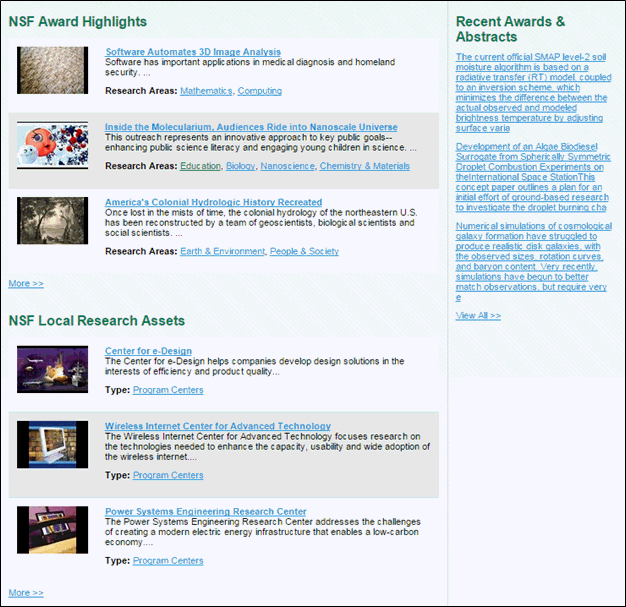
Figure 15 - State Homepage
Award Highlights show what exciting scientific research has been funded by NSF in each state or US territory. Highlights provide a snapshot about NSF awards as well as the outcomes of these projects and their benefit to society.
1. To see a full list of Award Highlights by using the Left-Hand Navigation clicking Award Highlights under state name (Figure 16)
OR
1. Clicking More under the “Award Highlights” section of the screen (Figure 16).
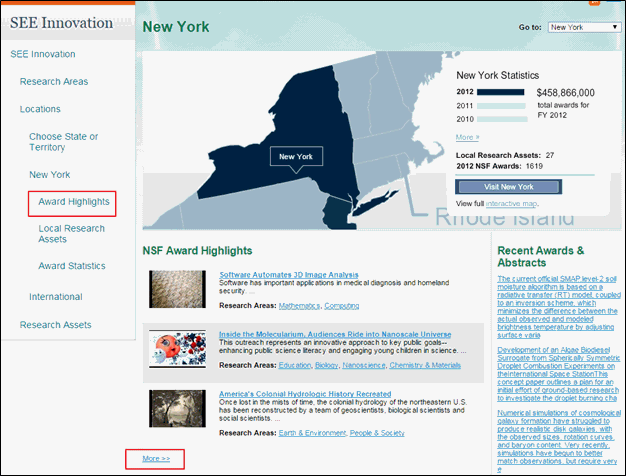
Figure 16 - Two Ways to View Full List of Award Highlights
2. On the Award Highlights Click on an Award Highlight of interest (Figure 17). You are able to filter the highlights by:
- Research Area
- Year
- Congressional District
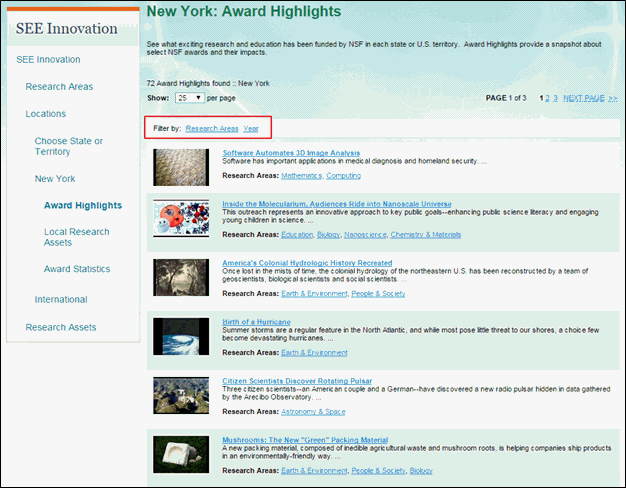
Figure 17 - Award Highlights Page
On an award highlight page (Figure 18) you will be able to find:
- A link to the Award information (this will take you to Research Spending & Results Award Detail page)
- Total estimated award amount
- States and Congressional Districts in which research was conducted
- Research Areas the award relates to
- Principal Investigator contact information
- Video or images relating to the highlight
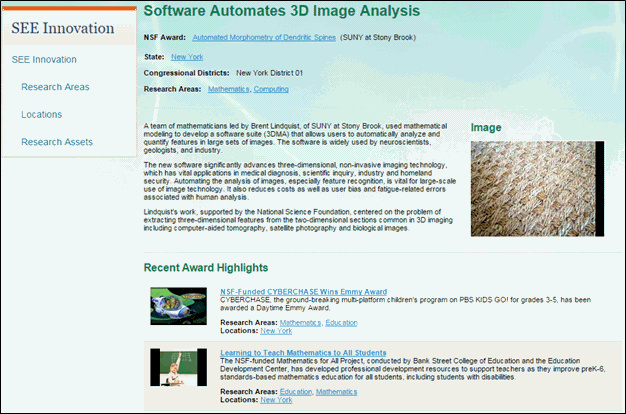
Figure 18 - Award Highlight Detail Page
To find detailed information about the award highlighted, click on the NSF Award Title to open the Research Spending & Results detail page for the Award Highlight (Figure19). The award detail page provides:
- Award or awardee name
- A range of the funds obligated to date
- Principal Investigator or Project Director name
- Award abstract
- Publication citations
- And more
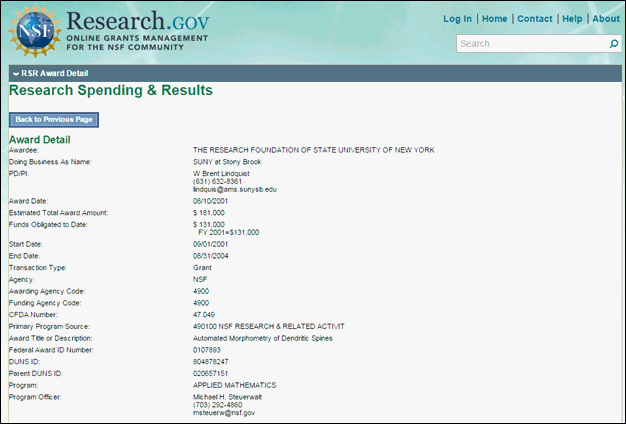
Figure 19 - Research Spending & Results Detail Page
Users can learn more about NSF funded work abroad on the Science, Engineering, and Education Innovation International page, including:
- Award Highlights: Brief summaries that provide a snapshot about the outcomes of NSF-funded research from FY2008 and beyond, as well as how the outcomes of these projects benefit society
- Research Assets: NSF funded research infrastructure, including program centers, facilities & networks, telescopes & observatories, and vehicles
From SEE Innovation homepage navigate to the International Awards page.
1. Click on the International link at the bottom of the “SEE Innovation” homepage (Figure 20) to open the “International” homepage.
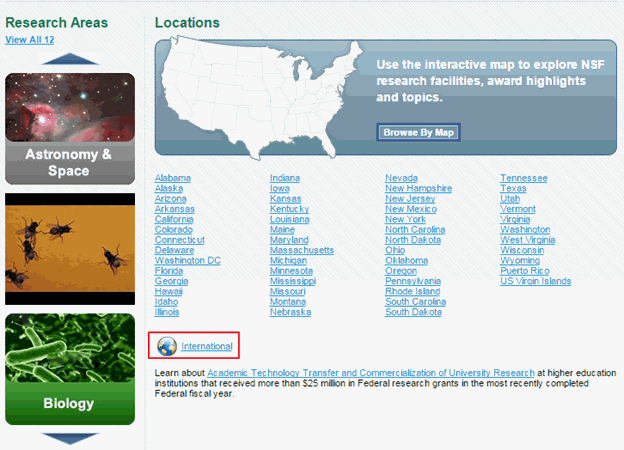
Figure 20 – International page link
2. There are multiple ways to navigate the Science, Engineering & Education Innovation from the International Homepage.
- Click through the image gallery on the top of the page to find:
- Recent Award Highlights: Snapshots about NSF science and research-related awards, with easy-to-understand summaries describing research outcomes of projects and their benefits to society.
- NSF Research Assets: Centers, facilities & networks, telescopes & observatories, and vehicles that make science and research possible